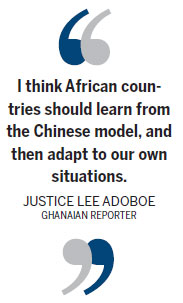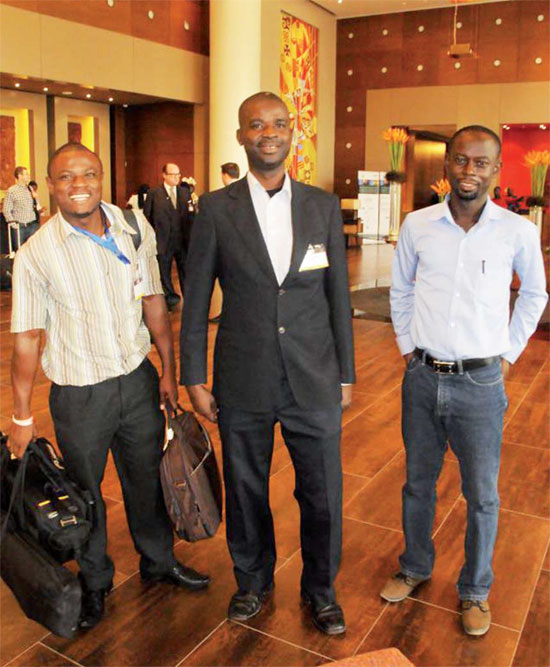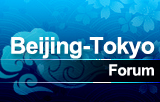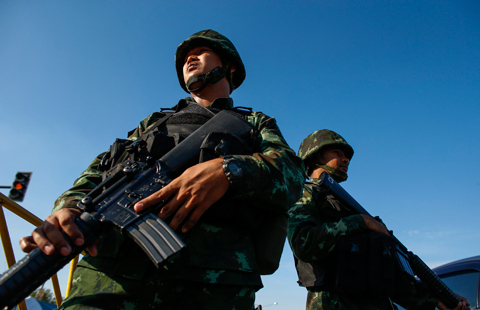A newsman's double identity
By Wang Chao (China Daily Africa) Updated: 2014-06-27 09:17
|
Justice Lee Adoboe (middle) says he keeps telling himself to meet international standards as a reporter in terms of the language and the story line. Provided to China Daily |
Working for Chinese agency xinhua has broadened Ghanaians' horizons
At a China-Africa media forum in Beijing this month, one of those attending, Justice Lee Adoboe, was happy to sit outside the conference room.
Adoboe, a journalist from Ghana, sat on a bench just outside the entrance, ready to grab an interview from which anyone heading inside, including dozens of ministers of communications from African countries.
The possibility of landing a big story proved irresistible to Adoboe, even if it meant forgoing the comforts other journalists inside the conference room were enjoying: tables on which to write, drinks and sweets, and simply being able to hear the speeches better. Adoboe reasoned that while he acted as sentinel he could also listen in what was being said inside.
Yet, during his three-week stay in China, the senior correspondent of the Accra bureau of Xinhua News Agency was supposed to be relaxing and enjoying himself rather than chasing deadlines and headlines.
Adoboe was one of 20 Ghanaian reporters invited by Chinese media partners to attend training sessions in Beijing and Guangzhou.
"We are falling in love with China, especially the great culture," Adoboe said. "But I don't understand why there are so many men smoking on the street and so many women dressed so Westernized," he chuckled.
Adoboe joined Xinhua in Ghana in 2010 after having worked for a local newspaper, Financial Intelligence, as a business reporter. His byline appeared in the newspaper often and he was eventually snapped up by Xinhua in Accra.
In his new post, Adoboe has broadened his scope from reporting on business and now reports on almost anything, from social events to politics.
"The bureau doesn't have a lot of people," he says. "Only one bureau chief, two Ghana reporters and a Chinese editor, so we have to multitask."
Adoboe says that since he began working for Xinhua his approach to his job has changed, given that those he is writing for are either Chinese or readers who could be anywhere in the world. Since most Chinese readers know little about Africa, a lot of background information and explanation is needed in the stories he writes, he says.
"I tell myself: 'You are now working for an international media outlet, and you need to meet international standards, both in terms of language or the story line. Now you are competing against other international media, especially the Western media.'"

As one of the two local reporters in Accra, Adoboe is always on the move, and he calls himself "the legs and hands of the bureau". "Most of my reports are filed in the field," he says.
The work gives him a new sense of achievement, he adds. In June 2012 he still remembers it was a Saturday he received a call from a friend who told him an aircraft had crashed, hitting a minivan, and further details were unknown.
"The crash site was a two-hour-drive from where I live, and it was raining. I jumped into a taxi and arrived 25 minutes earlier than any other international media."
Xinhua was the first news organization to break the news of the crash, he says, in which a Boeing 727 cargo plane had crashed into the van near Accra airport, killing 10 people.
On Monday when he arrived at work his boss stood up and asked staff to give a round of applause for is having got the scoop, he says.
As a local reporter who grew up in Ghana, Adoboe has good contacts. A few months after he joined Xinhua, a mine collapsed in another town. He was tied up with other things and could not get there, he says, but because he knew the local police commander he managed to get constant updates on the accident and again beat international media.
Since taking up his Xinhua post he has struggled as a Ghanaian who is writing for a Chinese media outlet, he says, so when reporting on any Chinese-Ghanaian conflict he has to ensure he is not biased.
Last year, for example, the Ghanaian government announced that some Chinese gold miners in the country were illegal immigrants and more than 100 Chinese workers were arrested. Some media in China treated the arrests as being "anti-Chinese" and wrote harshly critical articles, while Western media comment was largely critical of the Chinese.
"I worked closely with the immigration official to see how they dealt with the case, and I tried my best to show the real picture to readers. While it is true that some Chinese workers were illegal immigrants, I also learned that some were secretly brought in by Ghanaians."
After more than four years of working for Xinhua, Adoboe has established himself as a senior correspondent in the Accra bureau.
His articles are widely cited, and when he does a search of his name on the Internet, hundreds of articles pop up.
"It gives me a great sense of achievement," he says.
As a result of his work, Adoboe was selected as a member of the media delegation that came to China.
He says he experienced a cultural shock during in his three weeks in the country.
"China has fulfilled the dream of the developing world, and African countries should learn from the Chinese model, and then adapt to our own situations," he says.
"First, China has a solid manufacturing base, so it can export products to the world. But in Ghana we don't have manufacturing capabilities, so we have to import manufactured products and export primary commodities to the international market, so we have a big trade deficit.
"Second, we need to make good use of technological transfer from international companies in Ghana so we can learn and catch up."
China has a much more solid foundation than many other African countries to develop quickly, Adoboe says.
"People say China performed a miracle in developing in only 30 years, but that's not true. Magnificent towers were built in ancient China, and the Forbidden City has been there for centuries, so in history Chinese people have had great civilizations. It is more of a renaissance."
Having worked in local Ghanaian media for about 10 years and for Xinhua for nearly five, Adoboe says he has some tips for Chinese media in Africa.
"The right steps are being taken, such as partnering with local media outlets and trying to build a presence across Africa. But the most important thing is to be friendly to African readers and not to adopt a defensive approach.
"Keep open to local people. Take the gold mining incident as an example: We just need to acknowledge the rights and wrongs the Chinese workers have done and the readers can come to their own conclusions. By being neutral and objective you gain the trust of people everywhere."
wangchao@chinadaily.com.cn











